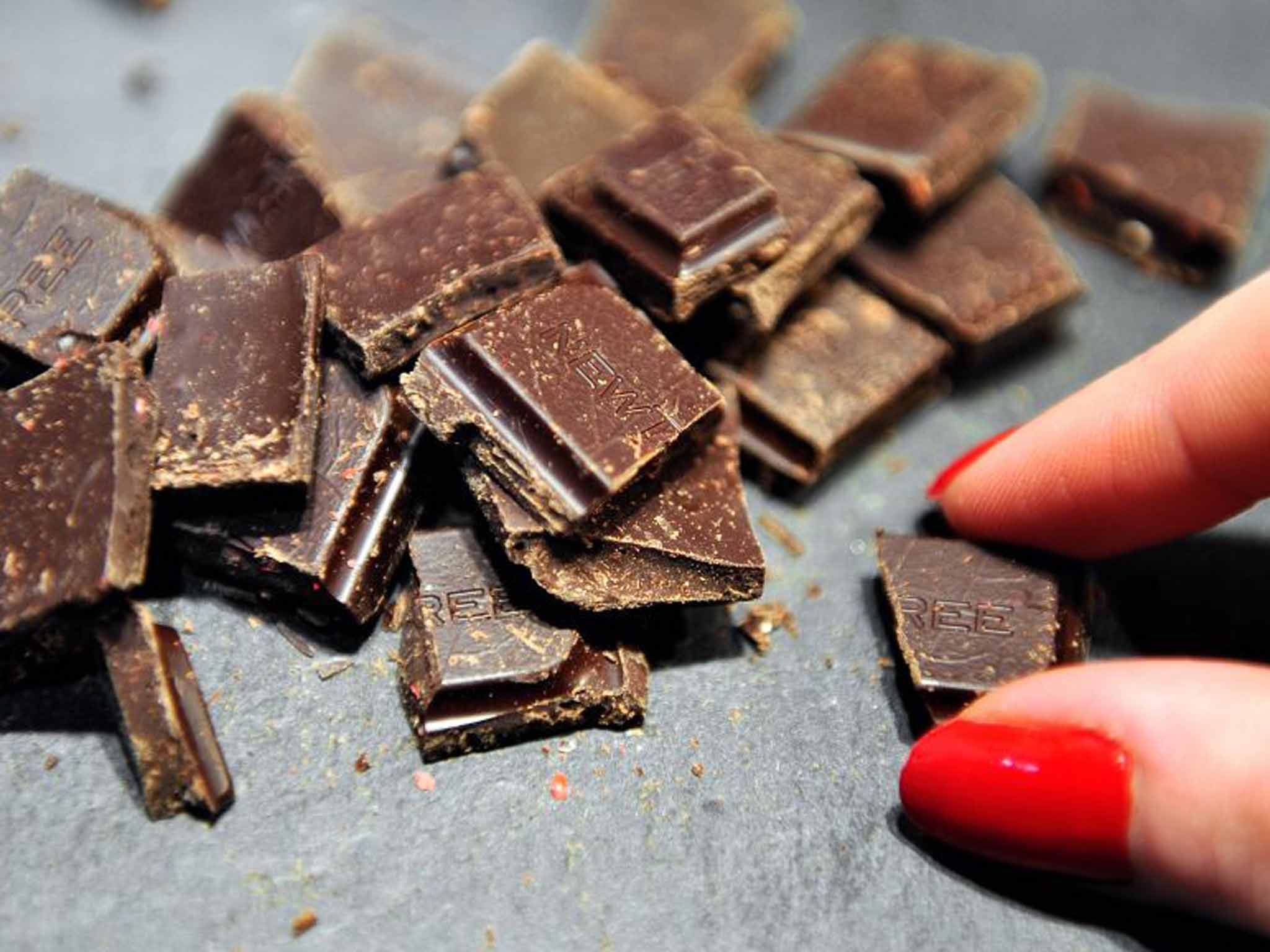Chocolate makes you cleverer: A 40-year psychological study proves that the sweet treat can boost our grey matter
Psychologist Merrill Elias has found evidence that chocaholics are more likely to be brainiacs

Your support helps us to tell the story
From reproductive rights to climate change to Big Tech, The Independent is on the ground when the story is developing. Whether it's investigating the financials of Elon Musk's pro-Trump PAC or producing our latest documentary, 'The A Word', which shines a light on the American women fighting for reproductive rights, we know how important it is to parse out the facts from the messaging.
At such a critical moment in US history, we need reporters on the ground. Your donation allows us to keep sending journalists to speak to both sides of the story.
The Independent is trusted by Americans across the entire political spectrum. And unlike many other quality news outlets, we choose not to lock Americans out of our reporting and analysis with paywalls. We believe quality journalism should be available to everyone, paid for by those who can afford it.
Your support makes all the difference.In the mid-1970s, psychologist Merrill Elias began tracking the cognitive abilities of more than 1,000 people in New York State. The goal was fairly specific: to observe the relationship between people's blood pressure and brain performance. And for decades he did just that, eventually expanding the Maine-Syracuse Longitudinal Study (MSLS) on cardiovascular risk factors. There was never an inkling that, after 40 years, his research would lead to any sort of discovery about chocolate.
But late in the study, Elias and his team had an idea. Why not ask the participants what they were eating too? Diets, after all, had been shown to affect the factors they were already monitoring. Plus, they had this large pool of participants at their disposal, a perfect chance to learn more about the decisions people make about food.
The researchers incorporated a new questionnaire – gathering all sorts of information about dietary habits – into the sixth wave of their data collection, which spanned the five years between 2001 and 2006 (there have been seven waves in all, each conducted in five-year intervals). And they revealed an interesting pattern. “We found that people who eat chocolate at least once a week tend to perform better cognitively,” says Elias. “It's significant – it touches a number of cognitive domains.”
The findings, chronicled in a new study published last month, come largely thanks to the interest of Georgina Crichton, a nutrition researcher at the University of South Australia, who led the analysis. Others had previously shown that eating chocolate correlated with various positive health outcomes, but few had explored its effect on the brain and behaviour, and even fewer had observed the effect of chocolate consumption. This, Crichton knew, was a unique opportunity. Not only was the sample size large but the cognitive data was perhaps the most comprehensive of any study ever.
In the first of two analyses, Crichton, along with Elias and Ala'a Alkerwi, an epidemiologist at the Luxembourg Institute of Health, compared the mean scores on various cognitive tests of participants who reported eating chocolate at least once a week with those who reported less. They found “significant positive associations” between chocolate intake and cognitive performance, associations which held even after adjusting for such variables as age, education, cardiovascular risk factors and dietary habits.
In scientific terms, eating chocolate was significantly associated with superior “visual-spatial memory and [organisation], working memory, scanning and tracking, abstract reasoning and the mini-mental state examination.” But as Crichton explains, these functions translate to everyday tasks, “such as remembering a phone number, or your shopping list, or being able to do two things at once, like talking and driving at the same time”.
In the second analysis, the researchers tested whether chocolate consumption predicted cognitive ability, or if people with better performing brains tended to gravitate toward chocolate. For this, they zeroed in on a group of more than 300 participants who had taken part in the first four MSLS waves as well as the sixth, which included the dietary questionnaire. If better cognitive ability predicted chocolate consumption, there should have been an association between the people's cognitive performance prior to answering the questionnaire and their reported chocolate intake. But there wasn't. “It's nearly impossible to talk about causality with our design,” says Elias. “But our study definitely indicates the direction is that chocolate consumption affects cognitive ability.”
Why, exactly, Crichton can't say. Nor can Elias, who admits he'd expected the opposite, given chocolate bars' sugar content. But they have a few ideas. They know, for instance, that nutrients called cocoa flavanols seem to have a positive effect on people's brains. (In 2014, one concluded it can “reduce some measures of age-related cognitive dysfunction”.) Meanwhile, a 2011 study, found they “positively influence psychological processes”. The suspicion is that eating the nutrient increases blood flow to the brain, which in turn improves a number of its functions. Also, chocolate contains methylxanthines, plant-produced compounds that enhance various bodily functions, among them, concentration levels.
A number of studies have confirmed this, including one in 2004 and another in 2005. But the message isn't that everyone should rush to stuff their faces with the magical sweet. “I think what we can say for now is that you can eat small amounts without guilt if you don't substitute chocolate for a normal balanced healthy diet,” Elias says.
Besides, the research isn't finished yet. “We didn't look at dark chocolate and lighter chocolate separately,” Elias points out. “That could tell us a lot more about what's going on. We also only looked at people who were eating chocolate never or rarely versus once a week or more. I'd really like to see what happens when people eat tons of chocolate...”
© Washington Post
Join our commenting forum
Join thought-provoking conversations, follow other Independent readers and see their replies
Comments